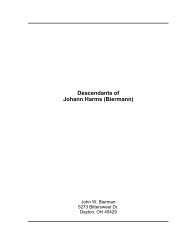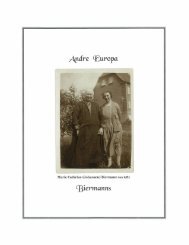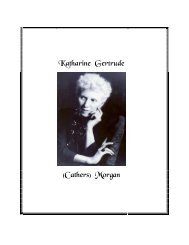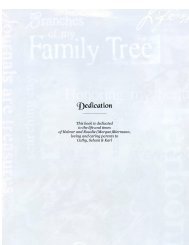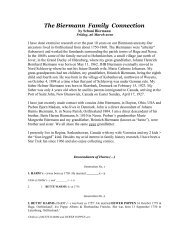A Collection of Dad's Essay's & Writings - Welcome
A Collection of Dad's Essay's & Writings - Welcome
A Collection of Dad's Essay's & Writings - Welcome
Create successful ePaper yourself
Turn your PDF publications into a flip-book with our unique Google optimized e-Paper software.
“My Soul Now Magnifies the Lord”, Hymn No. 180 in the LBW, has a text based on words from the gospel <strong>of</strong> St.<br />
Luke and with music by the famous German composer, Heinrich Schutz, who composed a Passion as well as a work<br />
for Christmas. When his employer the Elector Johann Georg <strong>of</strong> Saxony asked for music for the marriage <strong>of</strong> his<br />
daughter to the Landgrave <strong>of</strong> Hesse-Darmstadt he composed the first German Opera on the story <strong>of</strong> Dafne using a<br />
German translation <strong>of</strong> the Rinuccini libretto. Dafne has been the theme for a large number <strong>of</strong> operas. Schutz was born<br />
in 1585 and died in Dresden in 1672.<br />
Five hundred years ago a tune appeared that has received an enormous mount <strong>of</strong> attention as a secular pieces as<br />
well as a sacred selection and appeared as, “Innsbruck Ich Muss dich Lassen.” It has appeared as a solo vocal number,<br />
a choral number, performed on a lute, organ and various other ensembles. In the LBW it appears in three settings,<br />
including a variation but the tune name is “O Welt Ich Muss Dich Lassen”, indicating that the world is being left<br />
rather than the city <strong>of</strong> Innsbruck. With various texts the tune is used for hymn No. 222, 276 and 282. The melody is<br />
attributed to Heinrich Isaac, who was born in Flanders in 1450 and amongst other jobs he was a musician to the<br />
Medici family and later received an invitation from the Emperor Maximilian. He married Bartolomea Bello, whose<br />
father was something <strong>of</strong> a curiosity in the 15th century, being a very wealthy person although his occupation was that<br />
<strong>of</strong> a butcher, not exactly a noble calling in the Middle Ages.<br />
The Greek legend <strong>of</strong> Iphigenie, the daughter <strong>of</strong> Agamemnon and Clytemnestra, has been the subject <strong>of</strong> many<br />
dozens <strong>of</strong> opera librettos and all the early opera composers seemed to favor Greek tragedies as topics. Among the<br />
many composers who used the story was Ignaz Pleyel, a composer and piano maker as well as a pupil <strong>of</strong> Franz Josef<br />
Haydn. Hymn No. 225 in the LBW has music by Pleyel, who also arranged many folk songs for George Thomson <strong>of</strong><br />
Edinburgh. Pleyel also composed 29 symphonies. He was born in 1857 and died 1831.<br />
“Winchester Old” is a melody from the 16th century that has been set to words by Joseph Addison (1672-1719), a<br />
noted statesman who was also an outstanding essayist and poet. He traveled extensively on the continent and travels<br />
were recorded in a volume, “Remarks on Italy.” He was a friend <strong>of</strong> playwright Richard Steele who had founded the<br />
publication, The Tatler and contributed to the paper until he had a falling out with Steele. His text is used for the<br />
hymn opening with the words, “When All Your Mercies, O My God”, No. 264 in the LBW.<br />
“Beautiful Saviour”, Hymn No. 518 in the LBW, a favorite in several countries, is based on a Silesian folk song<br />
from that region <strong>of</strong> East Central Europe north <strong>of</strong> Bohemia and south <strong>of</strong> the Oder River. Silesia has been tossed about<br />
over the past four centuries between Prussia, Poland. Bohemia, Hungary, Germany, Czech Republic and occupied by<br />
other nations during various conflicts. Most <strong>of</strong> the region is now part <strong>of</strong> Poland with sections being agricultural, but<br />
also with districts that have large deposits <strong>of</strong> coal and other minerals. At one time there was a thriving weaving<br />
business. The city <strong>of</strong> Wroclaw was formerly the German city <strong>of</strong> Breslau. The melody has a German text dating from<br />
1677 and the melody has been used to a Danish text and sung at Christmas time as “Dejlig Er Jorden”.<br />
The text to the hymn No. 314, “Who Is This Host Arrayed in White”, is a translation from Danish plot Hans A<br />
Brorson. But Brorson was also responsible for the text to Hymn No. 52 “Your Little Ones, Dear Lord”, a favorite at<br />
Christmas time. Brorson, whose hymn texts are particularly popular in Denmark, was Bishop <strong>of</strong> Denmark’s oldest<br />
city, Ribe and had a particularly tragic life. He was a member <strong>of</strong> the Pietist movement and greatly affected by the<br />
worldliness <strong>of</strong> some people. He lost his wife just after becoming Bishop and 10 <strong>of</strong> his children died when young. He<br />
lived from 1694 until 1764 and his whole life was affected by the mystical side <strong>of</strong> Christianity.<br />
“Jesus, The Very Thought <strong>of</strong> You”, hymn No. 316 in the LBW, has words translated from verses written nearly<br />
1000 years ago by St. Bernard <strong>of</strong> Clairvaux. Bernard came from an affluent family near the city <strong>of</strong> Dijon in France and<br />
was to enter the Cistercian order and took along four <strong>of</strong> his brothers and about 25 friends and established a centre at<br />
Clairvaux. He journeyed continuously and was the advisor to several Popes and was instrumental in condemning the<br />
opinions <strong>of</strong> Peter Abelard, who opposed Bernard’s mysticism. He gained the title <strong>of</strong> Mellifluous Doctor because <strong>of</strong> his<br />
intense writings on the Scriptures and various treatises. He lived from 1091 until 1153. His verses for Hymn No 316<br />
were tranlated by Edward Caswell, who lived in the 19th century.<br />
The hymn, “Thine is the Glory”, uses a theme from the oratorio “Judas Maccabaeus” by Georg Friedrich Handel<br />
which was composed to celebrate the victory at Cullodon Moor. It was here that the Duke <strong>of</strong> Cumberland beat the<br />
Scottish forces under Bonnie Prince Charlie in 1746. Cumberland was the son <strong>of</strong> George II and when he defeated the<br />
Scots he treated them ruthlessly and earned the nickname, The Butcher. Handel, on the other hand, was suddenly<br />
hailed as England’s national composer and he was able to pay all his debts. A few years later he visited his native city<br />
<strong>of</strong> Halle in Germany. Handel was nearly killed in a carriage accident when on his way to Amsterdam. A short time<br />
later he lost his eyesight.<br />
Hymn No. 157 in the LBW is “A Hymn <strong>of</strong> Glory Let Us Sing” with text by the Venerable Bede who was considered<br />
the most learned man <strong>of</strong> his day. He was a Benedictine Monk who lived from 673 and wrote extensive commentaries<br />
on the Scriptures. He also wrote extensive treatises on 735 historical topics as well as scientific works, but consulted<br />
widely about many topics before he set down his words. He has given the most reliable account <strong>of</strong> the triumph <strong>of</strong><br />
Christianity in Britain and dealt widely with the culture <strong>of</strong> the Anglo-Saxons <strong>of</strong> the period from 575 to 731. “Holy,<br />
Holy, Holy,” which is hymn No. 165 in the LBW, has music by John Bacchus Dykes but the words are by Reginald<br />
Heber, who wrote the texts to many hymn tunes. One <strong>of</strong> them is the missionary hymn “From Greenland’s Icy<br />
Mountains” with music by Lowell Mason. The American composer Charles Ives, once used Mason’s tune as the<br />
centerpiece for his symphony No. 4 which demonstrated how a masterful composer can turn an otherwise<br />
uninteresting tune into a magnificent composition. Charles Ives, who was owner <strong>of</strong> his own insurance company, used<br />
many popular songs and hymn tunes in his major works and the Mason tune can also be heard in his first string<br />
quartet.<br />
Hymn No. 170 “Crown Him With Many Crowns” was composed by George Elvey who was born in Canterbury,<br />
England in 1816 and who also composed a Wedding March for the sixth child <strong>of</strong> Queen Victoria, Princess Louise who<br />
had Lake Louise in Canada named after her. She was married to the Marquess <strong>of</strong> Lorne who became Governor-



